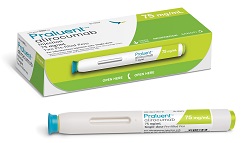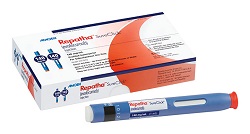When the FDA approved the first in a new generation of PCSK9 cholesterol fighters, the agency limited that approval: Amgen's ($AMGN) Repatha and Sanofi ($SNY) and Regeneron's ($REGN) Praluent are indicated for patients with familial hypercholesterolemia (FH), a hereditary form of ultrahigh cholesterol, and those who still have high cholesterol levels after aggressive doses of statins.
 Problem is, many people don't know they have FH. And that, reports CardioBrief, is where a concerted search-and-training effort comes in.
Problem is, many people don't know they have FH. And that, reports CardioBrief, is where a concerted search-and-training effort comes in.
Call it High Cholesterol Meets Big Data. Amgen and the Sanofi/Regeneron team are using new data-mining techniques to tap new sources of health information and identify new patients who are eligible for the new meds, the heart-focused news site reports.
The FH Foundation--supported by Amgen, Regeneron, Sanofi, and a couple of other PCSK9 developers, AstraZeneca ($AZN) and Aegerion ($AEGR)--established a registry to identify FH patients in the U.S. and track their treatments and outcomes. A newer campaign, financed by Amgen and the American Heart Association, is dubbed FIND FH. And under it, Stanford Medicine, the FH Foundation and Amgen are using computer algorithms to "troll through large databases including electronic medical records and locate patients who likely have the disease," Stanford's website states (as quoted by CardioBrief writer Larry Husten).
The idea is to use Stanford records on FH patients to develop a way to tag undiagnosed patients, and then run current Stanford medical records through that "classifier" to find any with FH. Tagged patients would be contacted by their doctors and evaluated for potential treatment, and possible follow-up screening of family members, given the fact that FH is a hereditary disease. Some 2,500 patients have joined the registry, the FH Foundation says, and more than 25% already have heart disease when diagnosed.
Those data-mining techniques will eventually be applied to data on 89 million people, CardioBrief notes, citing an FH Foundation tech adviser. The goal? To identify 1.2 million FH patients.
Meanwhile, Regeneron is spending $120 million on a research effort with Geisinger Health System; that partnership will search for genetic markers and compare them against medical histories, ultimately using their findings to screen patients for FH.
As CardioBrief notes in its extensive analysis, intensive efforts to identify FH patients could potentially lower the bar for diagnosis, triggering overtreatment with PCSK9 drugs, which carry list prices of more than $14,000 per year.
 In a response to CardioBrief's article, the FH Foundation said it's trying to emulate the CF Foundation, which started a national CF registry years ago, and has tracked CF patients over time. "This data-driven approach has resulted in life-changing therapeutic developments and the lifespan of CF patients is dramatically longer now than it was 20 years ago," Dr. Joshua Knowles, a Stanford assistant professor and chief medical adviser to the FH Foundation wrote, going on to state, "To make change requires data. Getting data requires resources."
In a response to CardioBrief's article, the FH Foundation said it's trying to emulate the CF Foundation, which started a national CF registry years ago, and has tracked CF patients over time. "This data-driven approach has resulted in life-changing therapeutic developments and the lifespan of CF patients is dramatically longer now than it was 20 years ago," Dr. Joshua Knowles, a Stanford assistant professor and chief medical adviser to the FH Foundation wrote, going on to state, "To make change requires data. Getting data requires resources."
Express Scripts ($ESRX), one of the pharmacy benefits managers that had pledged to fight high PCSK9 drug prices, recently said that its prior authorization hurdles has kept the number of eligible patients down, and as a result of that and some price negotiations, it won't be spending as much as feared on the meds this year. Digging up more than a million patients could push spending way up as time goes on, however.
But given the fact that ultrahigh cholesterol appears to be a strong predictor of heart disease, that might not be a bad thing for healthcare costs, especially if outcomes data on the PCSK9 meds shows that they really do cut cardiovascular risks. That data isn't due till 2017, however, as CardioBrief points out.
Husten contacted Peter Berger, who recently became the Senior Vice President of Clinical Research at the North Shore Long Island Jewish Health Care System and had been involved in Geisinger's early negotiations with Regeneron, about the data-mining efforts. Berger said he's "not concerned at all that by identifying and screening more patients we will be expanding the pool for these drugs, as long as the patients receiving such therapy are appropriately selected." He went on to say that "when I have a hyperlipidemic individual with LDL values [in the 400 range], my first obligation is to the patient, and not to societal needs to reduce the cost of health care."
- get CardioBrief's analysis
Special Reports: Top 15 pharma companies by 2014 revenue - Sanofi - Amgen | 10 top drugs in biopharma's late-stage pipeline - Alirocumab